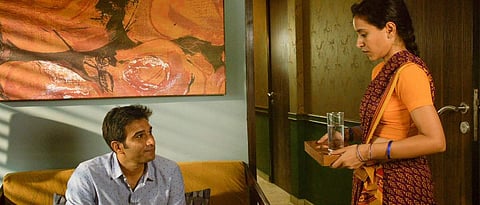

Out of 1,100 submissions, Rohena Gera's debut feature Sir is one of the seven films from across the world to make the cut for the Cannes Critics' Week. In telling the love story of a servant and the son of her upper-class employer, the director wants the voice of independent cinema to resonate with the "hungry" Indian audience that she feels is "tired of being talked down to."
Over the years, Indian representation at the prestigious Cannes Film Festival has been more about brand associations than the country's cinematic offerings. However, Gera doesn't deny the impact of the country's independent cinema on the global stage in the recent past.
"I think that mainstream Hindi cinema is pitched quite differently in terms of performance and narrative from a lot of world cinema. It's not something that everyone relates to, at least outside of India. But there are a lot of independent films that have been making inroads, such as Court or Killa. It would be great if we could have films that are able to make inroads internationally, but also get a strong release in India. I think the audiences are hungry for different types of films," says Gera, who moved to Paris last year.
With the visibility at the Cannes film fest sidebar -- which she sees as a "validation of years of work" -- Gera hopes Sir, which features actors Tillotama Shome and Vivek Gomber, also strikes a chord with the Indian audience. "I trust the audience, and I believe that they are making it very clear that they want interesting cinema. So, yes, I am optimistic that independent and challenging cinema will get a voice."
"I would say the market (in India) has changed... It's a question of us, the people who work in cinema, catching up to what the audience is waiting for. I have made my film for this audience, for the Indian audience that is not afraid of questions and that is tired of being talked down to. Now I have to make sure the film reaches them," she adds.
Sir happened to Gera after a "long, challenging, complicated and at times disheartening journey". She wrote some episodes of the TV show Jassi Jaisi Koi Nahin, and is credited with the story of the film Kuch Naa Kaho and screenplay of Thoda Pyaar Thoda Magic. She then directed a documentary What's Love Got to Do with It, which served like a transition that helped her understand what she wanted to do.
Indian films, says Gera, are caught in a "market logic" unlike French films -- which is why the more the laurels from international film festivals a film gets, the more the chances of being considered a "reliable package" for distribution.
"When it comes to getting the film financed or distributed, it's usually much, much easier if you have stars attached..star actors, or at least a star director or producer. In order for an independent film to be viable for a producer or distributor, they have to make sense financially as there are no subsidies. When an independent film gets noticed outside India, it stands out, which I don't think is surprising," she says.
"I think the good news is that audiences are rejecting bad films, no matter who stars in them. And that is great for all of us... because maybe people will start scouting for interesting, independent projects even before they make their way internationally," adds the director, who was among over a hundred cinema personalities invited at the Elysees Palace by French President Emmanuel Macron last month.
Gera is especially encouraged by how a majority of the seven films at the Critics' Week line-up are directed by women. Also, Nandita Das' Manto is the only Indian movie in the official Uncertain Regard section of the Cannes fiesta, which begins on May 8.
"It feels like a victory for us all... It is exciting to have this sort of good news at a time when women are facing a lot of adversity. It makes me confident that we will make our voices heard... no matter what."